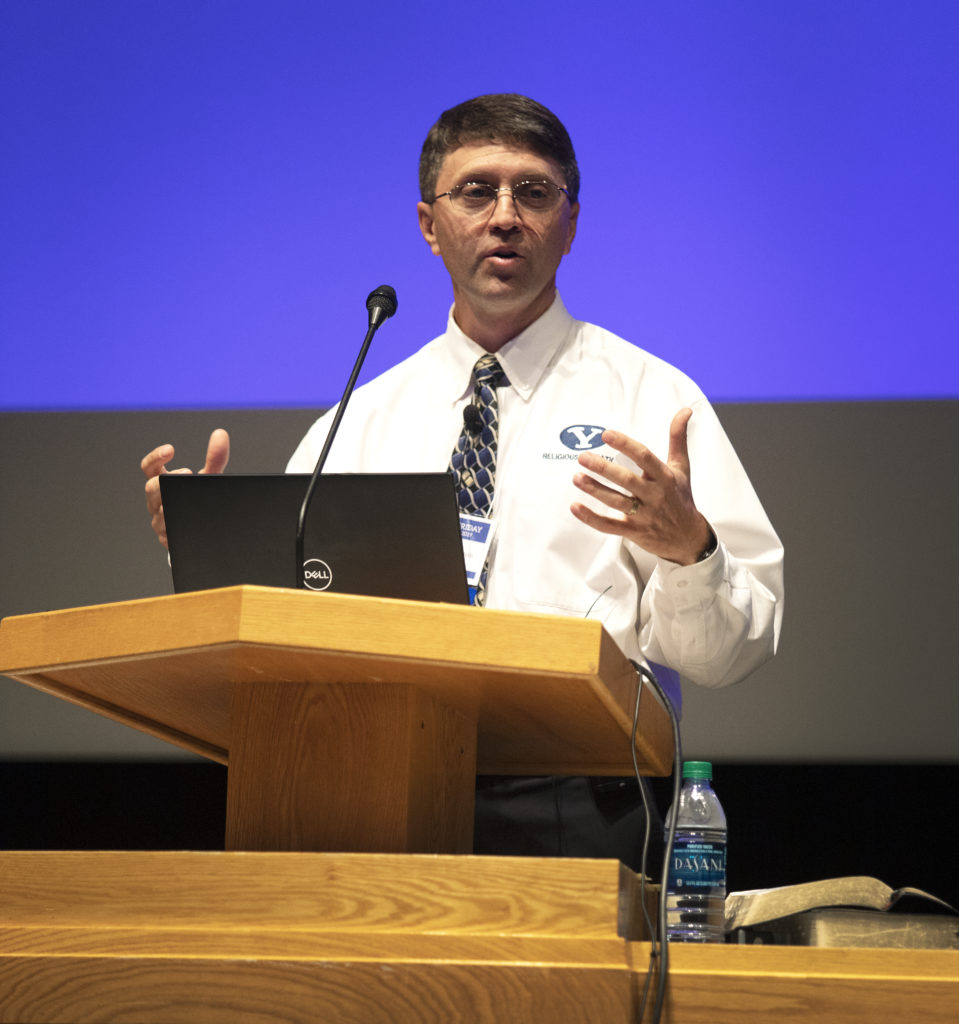
BYU professor of ancient scripture Kerry Muhlestein spoke at an Education Week session on Thursday about the Abrahamic Covenant as taught in the Book of Mormon and its relation to the present-day gathering of Israel.
“We are Israel,” Muhlestein said. “(The Abrahamic Covenant) is of transcendent significance.”
Addressing a full Joseph Smith Building auditorium, Muhlestein said he had felt the need to research and understand the Abrahamic Covenant, or “the Covenant,” so he put several other projects and books on hold. His focus was inspired by President Russell M. Nelson, who said there is nothing on Earth of greater consequence than the gathering of Israel.
Muhlestein cited President Nelson repeatedly throughout his presentation, drawing to the Prophet’s continual emphasis of the subject. President Nelson has often pointed to the Book of Mormon, which emphasizes the importance of the Abrahamic Covenant and the doctrine of the gathering of Israel, Muhlestein said.
“One of the major purposes of the Book of Mormon is to help all of us understand what is going on with the Covenant,” Muhlestein said.
In reference to the title page of the Book of Mormon, Muhlestein explained how statements such as, “that (the house of Israel) may know the covenants of the Lord,” and, “to the convincing of the Jew and the Gentile,” are evidence that the Book of Mormon was written, in part, to preserve an understanding of the Abrahamic Covenant.
Granted, Muhlestein said, the term “Abrahamic Covenant” never appears in the Book of Mormon, and the term itself draws implications of a promise made by the Lord only to Abraham. Muhlestein clarified that the Abrahamic Covenant is God’s covenant, and is also called the “New and Everlasting Covenant.”
“The Covenant was established with Adam,” Muhlestein said. “It’s ‘new’ because it keeps being reestablished; it’s ‘everlasting’ because it’s always been around and its blessings will go on for forever.”
In short, Muhlestein said, the Covenant is a promise from God to His chosen people, with attached blessings and cursings for subsequent obedience or disobedience. Muhlestein compared fragments from Leviticus 26 and 1 Nephi 2 to identify the promised blessings or cursings, and both the Old Testament and Book of Mormon verses cited innumerable posterity, land, prosperity and the gospel with its ordinances among the blessings for obedience to the Covenant.
A major aspect of the Covenant referenced briefly in the Old Testament but made clear in the Book of Mormon is the doctrine of the gathering of Israel.
Muhlestein asserted that the two major themes of the Book of Mormon are, first, the Atonement of Jesus Christ, and second, the Abrahamic Covenant and gathering of Israel. To back this up, he showed a series of graphs illustrating his literary analysis of the Book of Mormon, counting verses that referenced the Covenant. He said the Book of Mormon, as a whole, contains 6,604 verses, and a staggering 988 of them, or 15%, have clear references to the Abrahamic Covenant. The theme is treated heavily, even increasingly, in the first three books of the Book of Mormon: 1 Nephi (31% of verses include a reference to the Covenant), 2 Nephi (45%), and Jacob (46%).
Such frequent references, he said, likely had the purpose of helping people understand that the Covenant applies to them personally, as Nephi explained in 1 Nephi 19:23-24.
“The scriptures are about the people of the Abrahamic Covenant,” Muhlestein said. “Therefore, everything that happens in there has an application in your life. It will happen for you. As you read what Isaiah says will happen to ancient Israel, know that in some way, it applies to you. Because it’s about the Covenant — the same Covenant that you’re a part of.”

Muhlestein said that as he progressed through his literary analysis, he realized that references to the Abrahamic Covenant decreased drastically for most of the remainder of the book, until Christ’s visit to the Americas in 3 Nephi. Muhlestein’s explained as that this is because of ideas surrounding “personal salvation” and “communal salvation”.
“We think of our covenants as an individual thing between us and God,” Muhlestein said. “But it’s not. … The Covenant is about us being saved together. It is about communal covenants.”
Muhlestein gave examples of the making and renewing in covenants in groups, as is done in sacrament meeting or the temple. Communal covenants, he said, are a key part of organized Christianity — all believers have the responsibility to foster relationships with Deity and one another and to “bear one another’s burdens” in the process. “It is about the community being saved together, and you can’t be saved alone,” he said. “That’s the emphasis on the Covenant.”
Muhlestein said this explains the drastic decline in references to the Abrahamic Covenant in the Book of Mormon following the Book of Jacob — the authors focused more on individual salvation and the emphasis on “corporate covenants” faded.
“The more we focus on individual salvation as part of the Covenant, or individual salvation at all, the less we focus on the Covenant, period. The more we focus on communal salvation, the more we focus on the Covenant,” Muhlestein said.
When Christ visited the Americas in 3 Nephi, he reintroduced this crucial theme — ”with a passion,” Muhlestein said — by referencing the Covenant in one of every three verses during His ministry to the Nephites.
In short, in order to understand the Book of Mormon’s message regarding the Abrahamic Covenant and the gathering of Israel, we need to understand that the Covenant goes beyond individuals.
“It’s not just that the Covenant is important, but it is important that we recognize and realize the communal nature of the Covenant, or as President Nelson would put it, ‘The need to gather Israel on both sides of the veil.’ When we don’t focus on that, we will lose sight of the Covenant. … But when we do focus on that, the Covenant will become ever more important in our lives,” Muhlestein said.




